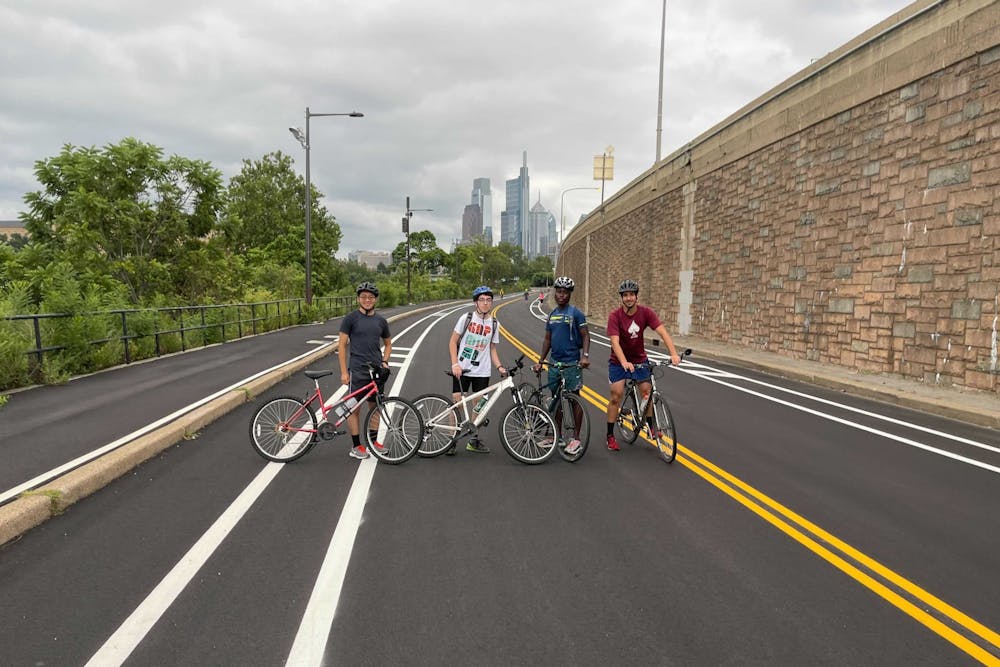My bike wheels hum and turn with every pedal. The sun reflects off of the Schuylkill River as slow streams of sweat trickle down my forehead. My heart rate drums against my chest at a consistent pace of 130 beats per minute. A canopy of trees offers me a quick respite from the heat as I pass a young family out on a walk. Nothing but a smile radiates off my face as I zip down Martin Luther King Drive (MLK Drive).
The indefinite closure of MLK Drive in March 2020 due to COVID-19 was a personal bright spot amidst an otherwise difficult year, and I’m not the only one who enjoyed this new opportunity. Data from the professional service firm WSP shows that 13 times more people used MLK Drive compared to pre-pandemic times, with highs of 5,000 people per day on weekdays and more than 9,500 on weekends. MLK Drive, a beautiful four mile stretch of road running right alongside the Schuylkill River and through Fairmount Park, allowed me and other residents of Philadelphia to clear our heads from the forced isolation caused by the COVID pandemic.
Despite this, the City of Philadelphia announced that they would reopen the MLK Drive for vehicle traffic at 5 p.m. on Wednesday, August 4th. While parts of the Drive will remain closed during limited hours for weekend recreational use and city holidays, this is not enough. Mayor Jim Kenney and the rest of his staff must permanently close Martin Luther King Boulevard to cars. New York City permanently closed Central Park to cars — Philadelphia can do the same with the Drive.
The expansive space and unique scenery on MLK Drive provide a unique opportunity for exercise. In an interview with The Philadelphia Tribune, native Philadelphian Maria Becker Gallagher stated, “I’m a breast cancer survivor, so this [exercise on Martin Luther King Drive] keeps me in good shape… That’s what I do to keep positive since there’s nothing going on and we were stuck in the house [due to COVID].”
While decreased COVID transmissions have led to looser social distancing restrictions, keeping the Drive closed to cars still presents many benefits. First and foremost, the boulevard’s proximity to the Schuylkill River and large space makes it a perfect location for exercise. Studies show that exercise can increase your chances of living longer, improve your sexual and mental health, reduce your risk of heart disease, and more. Not to mention, exercise can have a profoundly positive impact on depression, anxiety, stress, happiness, and more.
Furthermore, psychological studies demonstrate that government policies that alter physical environments can promote healthy behaviors. As stated in the study by Wendy Wood and David Neal, “U.S. residents with access to parks closer to home engage in more leisure-time physical activity and have lower rates of obesity.” Other studies suggest that physical activity increases as cities provide more green recreational parks as well as spaces to walk, bike, and run.
Permanently closing MLK Drive (an expansive road with ample green space) to cars can, therefore, be viewed as an important yet simple public policy decision to improve the entire city's health. For example, Minneapolis-St. Paul was rated as the nation’s fittest city after making a commitment to expand bike lanes and create safe sidewalks.
More than just exercise, closing the MLK Drive to cars also creates a safer city. The boulevard is a part of Philadelphia’s High Injury Network, a network of roads that account for 80% of all traffic deaths and serious injuries on just 12% of streets. Kenney should aim to reduce deaths in his city and he could begin by permanently closing MLK Drive to cars.
SEE MORE FROM DANIEL GUREVITCH:
Given some citizens' concerns about increased traffic patterns in the neighborhood, Kenney and his administration should, at the very least, explore options to open MLK Drive while also creating a more conducive space for pedestrians. Proposals to turn the four lane Drive into a two lane road with three spaces (one for motor vehicles, one for people on bikes, and one for walkers and runners) offer a unique alternative to fully reopening the Drive to cars. Note, however, that petitions to open MLK drive have only around 350 signatures compared to 6,000 to keep the road closed.
Regardless of the final proposal accepted, it is clear that the City of Philadelphia cannot revert to the past. The COVID-19 pandemic allowed Kenney to try something different by closing the MLK Drive to cars. The end of COVID lockdowns doesn’t necessitate the end of innovative ideas. If anything, we have an opportunity to continue them.
If you believe that Martin Luther King Drive should be permanently closed to cars then I strongly urge you to sign this petition as soon as possible and urge your friends to do the same. If not, try walking or biking down the MLK Drive, then let me know what you think.
DANIEL GUREVITCH is a rising College sophomore from Wynnewood, Pa. studying political science and philosophy. His email is dgure@sas.upenn.edu.









